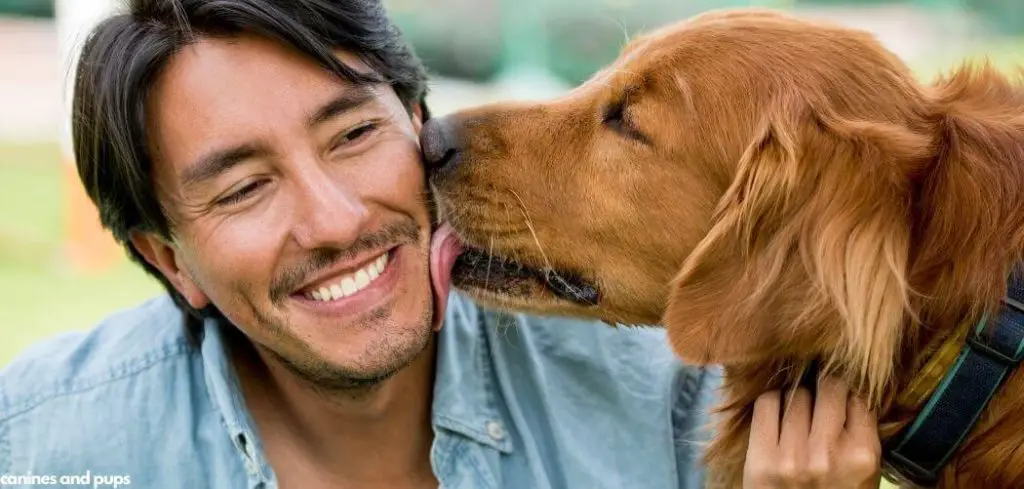Panting and licking their owner can be both endearing and concerning, depending on the frequency and intensity.
While some dogs lick as a form of affection, persistent panting and licking may indicate stress or a health issue.
We outline the common reasons why dogs may pant and lick their owners, what you can do, and when to seek veterinary help.
Dog Panting and Licking Me — Why It Happens
If your dog pants heavily while licking you, it’s often a mix of seeking comfort and showing affection while feeling stressed or unwell. Dogs may lick their owners to cope with anxiety, pain, or nausea. It can also happen if they’re overheating and looking for reassurance.

Dog Panting and Licking Me: Common Causes
Anxiety or Stress
Panting and licking you can be a sign of anxiety or stress. Dogs often lick as a calming mechanism for themselves when they feel nervous or overwhelmed.
Triggers include loud noises, changes in routine, separation from family members, or unfamiliar environments. You may notice other signs such as pacing, whining, or attempts to hide, alongside panting and licking.
Read more: Dog Panting and Licking Floor (Why it happens and what to do)
Affection and Bonding
Dogs also lick their owners to show affection and strengthen social bonds. This behavior is more common in puppies or highly social dogs.
Panting may accompany excitement or happiness. While generally harmless, excessive licking can be a sign of over-arousal or the dog seeking comfort when stressed.
Hunger or Thirst
Your dog may lick you when they are hungry or thirsty. Panting can accompany this if the dog is anxious or excited.
Dogs sometimes associate their owner with feeding and may lick as a way of communicating their needs. Observing feeding patterns and ensuring regular meals and water access can reduce this behavior.
Medical Conditions
Panting and licking may indicate an underlying medical condition. Pain, nausea, or oral discomfort can prompt dogs to lick themselves or their owners as a coping mechanism.
Signs to watch for include drooling, vomiting, diarrhea, lethargy, or changes in appetite. Conditions such as dental disease, gastrointestinal upset, or hormonal imbalances may be at play.
Attention-Seeking Behavior
Dogs quickly learn that licking can elicit attention from their owners. If licking results in petting, talking, or treats, the behavior may be reinforced.
Panting may accompany excitement or anticipation. Redirecting attention with toys or commands can help reduce excessive licking.
Compulsive or Behavioral Disorders
Some dogs develop compulsive licking behaviors. This can be due to stress, boredom, or neurological issues. Panting may accompany compulsive behavior due to anxiety or heightened arousal.
Repetitive, obsessive licking of their owner can indicate a compulsive disorder that warrants veterinary or behavioral intervention.
Read more: Dog Panting and Licking a Lot (Causes and solutions)
What to Do If Your Dog Is Panting and Licking You
Monitor your dog to understand the context of their panting and licking. Observe whether it occurs during stress, hunger, excitement, or in a medical context.
Provide mental and physical stimulation through walks, toys, and interactive play. Reducing boredom or over-arousal can help decrease attention-seeking licking.
Ensure your dog has regular meals and access to fresh water. Addressing hunger or thirst reduces the likelihood of licking as a communication tool.
Check for signs of pain, oral issues, or gastrointestinal problems. Regular veterinary check-ups can identify conditions that may cause licking and panting.
If panting and licking persist or intensify, consult your veterinarian. They can rule out medical issues, provide behavioral guidance, and recommend safe strategies to manage the behavior.
When to Call or Visit Your Vet
Seek immediate veterinary attention if your dog shows:
Persistent, excessive panting and licking
Drooling, vomiting, diarrhea, or refusal to eat
Signs of oral pain or gum swelling
Lethargy, disorientation, or collapse
Behavioral changes or compulsive licking that worsens
Early intervention can prevent serious complications and improve your dog’s comfort and well-being.
Read more: Dog panting excessively (Here’s Why)
Key Takeaway
Panting and licking you is often a combination of affection, communication, and sometimes stress or health concerns.
Observing the behavior, providing a safe environment, addressing basic needs, and consulting a veterinarian when necessary ensures your dog’s comfort and health.
With early recognition and proper care, you can help your dog feel secure and reduce excessive panting and licking.
